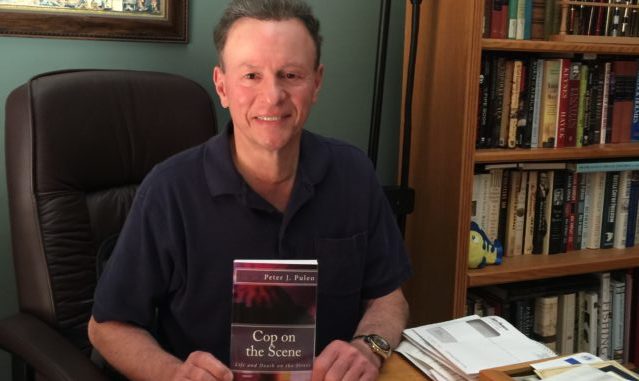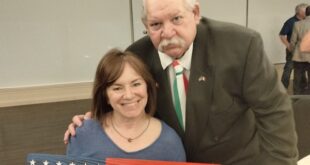Let me introduce the readers to, as they say, “a guy from the neighborhood,” Peter J. Puleo. Peter served as a public servant, a police officer in a suburban community for the best part of his career. He also was a college professor. And now, in addition to these distinguished accomplishments, he became an author — a really talented author.
His grandparents were born and raised in Italy, near Rome on one side and in “a little town just outside of Palermo,” the town of Partinico, on the other. They came to the United States after the First World War, like most of our families. His grandfathers were soldiers in the Italian army during that “war to end all wars.” Like many of us, Peter remembers one of his grandfathers telling him about his memories of the passage to his new homeland, his dreams of a new life, new opportunities, and the process of going through Ellis Island.
The Puleo family settled in Chicago, in one of our neighborhoods around Taylor Street. His parents and aunts and uncles and cousins were all born there, as was he in 1948. He was raised in that neighborhood and remained there until 1964 when the family moved to the suburbs, also like many of us. The first school he attended was Our Lady of Pompeii.
In high school, Pete worked part time in grocery stores owned by the Gargano family and later the Frisella family, names familiar to the “old timers.” While living in the suburbs as a college student, he traveled each day back to the old neighborhood to attend the University of Illinois, graduating with a Bachelor of Arts degree, got married to his wife Janet, spent some time in the military, worked as a casualty claims investigator for insurance companies. Then, he joined a suburban police force when he was 26 years old. He and his wife Janet began their family, which blessed them with his three daughters, Jennifer, Melissa, and Stephanie. During the 25 years on the police force, he gradually rose rank by rank to become the Chief of Police after 18 years of service. During that time, Peter acquired his Master of Science degree from Loyola University and his Master of Arts degree from the U of I, back in the old neighborhood yet again. Obviously a Renaissance man, and multi-talented, and one conscious of his ethnicity and his origins.
Puleo served as Chief of Police for seven years and wrote a book during the evenings and on the weekends. During those seven years, he taught as an adjunct instructor at Triton College in River Grove and at the U of I and is, in his own words, “ back yet again in that wonderful old neighborhood.”
Peter’s book “Cop on the Scene,” is a wonderful small paperback containing about 77 short essays depicting many of his life’s experiences “on the job,” as a person sworn to serve and protect, as a first responder, as a sensitive human being, experiencing all the pathos and drama of living in these difficult times — the jobs, the challenges, the highs and lows of being in law enforcement.
Some essays are as short as a page and a half, others no longer than eight pages.
In his own words: “These are brief essays of what police officers encounter every day and each night. Police intersect with the lives of others during times of crisis, when these goodly citizens have done something wrong, or bizarre, or careless, or when something has been done to them by other good citizens … these interactions are brief, inexplicable and lack the tidy beginning, middle, and end to be found so neatly packaged in police novels and movies.”
After retiring from the police force, Puleo accepted a job at Harper College in Palatine, Illinois to teach criminal justice for 13 years and retired as an associate professor in 2013. It was during that happy time that his four grandsons and four granddaughters were born, the blessed and wonderful gifts to him and Janet from their daughters and three fine sons-in-law. Paul Russo, husband of Stephanie and prominent national real estate developer with offices in Chicago, says of his father-in-law, “Peter has been a wonderful patriarch, welcoming and supportive, and for him and his two young sons, Pete’s grandsons, serves as a wonderful role model — someone to emulate and look up to.”
In his own words, Peter says: “This seems like a long journey, as it is for any man, and yet it seems so short and it passed so quickly.” He wrote his book “Cop on the Scene: Life and Death on the Street” as a memoir of his 25 years on a police force. It is part lyrical, part action, part philosophical, part humorous, and all true as he lived and experienced it.
He writes sort of like Norman Mailer and he writes of Damon Runyonesque characters. Like the short story titled “Actress,” about a woman he met on a well-being call, that brought to his mind, MacBeth, Act I, Scene III. “She had the look. Irrational behavior caused by mental illness … of course, insanity is internal and pointedly manifests itself in behavior … the unfocused stare, the inappropriate laugh, the twitch, the immobile facial rictus, the mussed hair, the unshaven slovenliness. She had the look. It was a dismally cold and winter evening when we got the call … “
Like the story “Dinnertime” about a domestic disturbance call that ended with a “t-bone on skull-bone.”
“Domestic disturbance calls are job security for the policing profession. Even in some future Eden, when all criminals mend their ways and become men of the cloth or women of the veil, there will be enough disturbances to provide a few police careers.”
Or the story titled “Bottled Ferocity,” an example of the impact on the never ending activities of the cop on the street.
“It emboldens some. It sickens some. It dulls some. Some it thrills, others it angers. Some get happier with each drop drained, and the night weans on, and the long slow process continues among cigarettes, and insane humor, and idle chatter, and tales of loves lost told loudly amidst the background roar of music.”
Or in “Entomology,” a story of aging and hopelessness, a reality in every big city in America:
“Today’s emphasis on compassion and euphemisms would designate him as a ‘homeless man.’ A few decades ago, he was simply a ‘bum.’ He was merely a ‘vagrant’ in police language when I got a call to check him out … His slack-jawed mouth showed several remaining teeth of banana yellow, precariously cantilevered this way and that. He might have just hopped off a time machine from some plague infested back alley of a medieval European city. Years before, I had seen an old photograph of a mendicant in a sociology text book. I never thought I would see one in real life, yet there he was in front of me. Of course, police work isn’t real life, it is surreal, and there you have it.”
“Cop on the Scene: Life and Death on the Street” by Peter J. Puleo, was published and distributed by Litchfield Literary Books. (www.litchfieldliterarybooks.com, (866-248-7924))
The book is available on Amazon.com in both paperback and as a Kindle ebook.
A wonderful profile of a “guy from the neighborhood” who wrote a terrific little book after a diverse, interesting career. Another example of the best of our community.
 Fra Noi Embrace Your Inner Italian
Fra Noi Embrace Your Inner Italian






